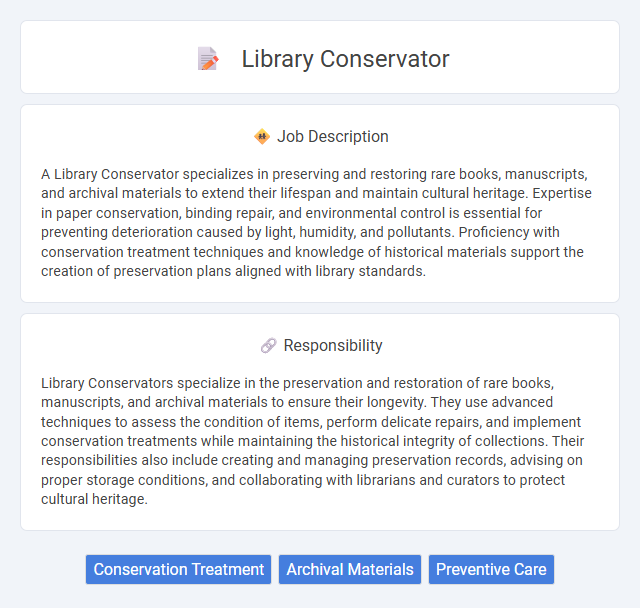
A Library Conservator specializes in preserving and restoring rare books, manuscripts, and archival materials to extend their lifespan and maintain cultural heritage. Expertise in paper conservation, binding repair, and environmental control is essential for preventing deterioration caused by light, humidity, and pollutants. Proficiency with conservation treatment techniques and knowledge of historical materials support the creation of preservation plans aligned with library standards.
Individuals with strong attention to detail and a passion for preserving historical materials are likely suitable for a Library Conservator role. Those who prefer hands-on, meticulous work and have a calm, patient disposition may find the job fulfilling and manageable. People who struggle with repetitive tasks or lack interest in archival preservation might find this career less compatible with their personal strengths.
Qualification
A Library Conservator must possess advanced knowledge in bookbinding, paper chemistry, and archival preservation techniques, often supported by a degree in library science, conservation, or a related field. Expertise in handling rare manuscripts and digital preservation tools is essential to maintain the integrity of historical collections. Proven experience in environmental control and treatment protocols ensures effective long-term care of library materials.
Responsibility
Library Conservators specialize in the preservation and restoration of rare books, manuscripts, and archival materials to ensure their longevity. They use advanced techniques to assess the condition of items, perform delicate repairs, and implement conservation treatments while maintaining the historical integrity of collections. Their responsibilities also include creating and managing preservation records, advising on proper storage conditions, and collaborating with librarians and curators to protect cultural heritage.
Benefit
A Library Conservator likely offers significant benefits in preserving rare and valuable collections, increasing the longevity of library materials. The role may enhance access to historical documents and artworks, supporting research and education. Working as a conservator probably provides opportunities for specialized skills development and professional growth in cultural heritage preservation.
Challenge
Library conservators likely face challenges in preserving delicate and aging materials while balancing modern accessibility requirements. The probability of encountering complex restoration issues increases as collections grow older and more diverse. Adapting to evolving technologies and conservation techniques may also present ongoing difficulties in maintaining historical integrity.
Career Advancement
Library Conservators specializing in rare books and archival materials often progress to senior conservation roles or managerial positions within cultural heritage institutions. Mastery in advanced preservation techniques and digital restoration technologies significantly enhances promotion opportunities in prestigious libraries and museums. Engaging in specialized certifications and contributing to conservation research projects accelerates career growth and recognition in the field.
Key Terms
Conservation Treatment
Library Conservators specializing in conservation treatment meticulously assess and stabilize rare books, manuscripts, and archival materials to prevent deterioration. They employ advanced techniques such as deacidification, paper mending, and humidity control to preserve the physical and historical integrity of collections. Expertise in chemical composition and material science ensures effective restoration while maintaining authenticity and longevity of library artifacts.
Archival Materials
Library conservators specializing in archival materials play a crucial role in preserving historical documents, manuscripts, and rare books to ensure their longevity and accessibility. They employ advanced techniques such as deacidification, humidification, and specialized storage solutions to prevent deterioration caused by environmental factors and handling. Expertise in materials science and conservation ethics is essential to maintain the integrity and authenticity of invaluable cultural heritage collections.
Preventive Care
Library Conservators specialize in preventive care to protect and prolong the life of rare books, manuscripts, and archival materials through controlled environmental conditions and careful handling procedures. They routinely assess collections for signs of deterioration such as acidification, mold, and physical damage, implementing measures like custom enclosures, climate control systems, and pest management to mitigate risks. Their expertise in material science and treatment techniques ensures the preservation of cultural heritage assets while enabling safe access for research and public use.
 kuljobs.com
kuljobs.com